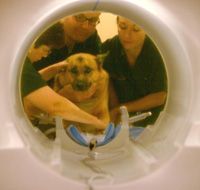Can a microchip cause cancer?
As if frequency incompatibility isn't headache enough for the pet microchip industry and pet owners, studies show that microchips could cause cancer. In 2004, after investigating microchipping, the Food and Drug Administration (FDA) found the process to be safe enough for use in humans and animals. However, since the 1990s studies have shown evidence that microchips cause cancerous tumors to develop in rats and mice. One 2001 study revealed that 1 percent of the rats tested developed these tumors on their bodies near the place where the microchip was implanted [source: Elcock].
Katherine Albrecht, who founded Consumers Against Supermarket Privacy Invasion and Numbering (CASPIAN), wants the microchipping of humans to end, so she has been pushing these types of studies into the public eye. Her efforts succeeded when the Associated Press released a story in September 2007 indicating that manufacturers of microchips for humans dismissed (or were irresponsibly unaware of) studies that show microchips might lead to cancer. When the story broke, the companies' shares sharply fell [source: Feder].
Advertisement
Albrecht's CASPIAN group then published a summary she put together of 11 studies performed between 1990 and 2006 that investigated the microchip-cancer link, including the one we just mentioned. Most of these studies research rodents, but a few used dogs to attempt to discover whether there was causal link. Albrecht's report stated that eight out of the 11 studies found evidence for a link, as malignant tumors (often sarcomas, which affect connective tissue) developed near the area of the chip in many of the animals [source: Albrecht]. Albrecht concluded that the three studies that did not find this evidence were "deeply flawed" as they failed to either test a large enough population of animals or for a long enough period of time [source: Albrecht].
However, some believe more research is needed for conclusive proof. Skeptics argue that the conclusive evidence only applies to rats and mice, and the same evidence has not shown up in pet populations, despite the large numbers of microchipped pets. And who's to say whether the animals used in the study were predisposed to cancer [source: DVM]? Other people believe that the chance of the microchip causing cancer in a pet is miniscule compared to the benefits of pet recovery [source: Feder].
It's up to you to decide whether pet microchips are right for your pet. Read the next page to find links to more articles about animals and RFID technology, as well as Web sites of some major organizations behind microchipping.
Related HowStuffWorks Articles
More Great Links
Sources
- "AVID's 24hr PETtrac Database Service." AVID. (April 10, 2008) http://www.avidplc.com/implanters/pettrac-microchip-database.asp
- "Bio-Sensing." Digital Angel. (April 10, 2008) http://www.digitalangel.com/biosensor.aspx
- "Did you Know? In El Paso." The City of El Paso, Texas. (April 10, 2008) http://www.elpasotexas.gov/community/_archive/032706/health1.asp
- "Documentation Library." Identipet. (April 10, 2008) http://www.elpasotexas.gov/community/_archive/032706/health1.asp
- "The HomeAgain Advanced Pet Recovery Service." HomeAgain. (April 10, 2008) http://www.homeagain.com/3_0.html
- AKCCAR. "Love Brings People and Pets Together." American Kennel Club Companion Animal Recovery. (April 10, 2008) http://www.akccar.org/microchip/
- Albrecht, Katherine, Ed. D. "Synopsis of 'Microchip-Induced Tumors in Laboratory Rodents and Dogs: A Review of the Literature 1990-2006." CASPIAN. Nov. 19, 2007. (April 10, 2008) http://www.antichips.com/cancer/albrecht-microchip-cancer-synopsis.pdf
- AMACA. "US Department of Agriculture Endorses Microchips to Identify American Pets." American Microchip Advisory Council for Animals. Sept. 4, 2007. (April 10, 2008) http://www.microchipidsystems.com/UserFiles/File/Release%20USDA%20Report%20%2007.pdf
- Banfield. "Information on Banfield's Microchip Program." Banfield: The Pet Hospital. Jan. 31, 2007. http://www.banfield.net/about/article.asp?id=6
- DVM. "AVMA calls for research on microchip-cancer link." DVM: The Newsmagazine of Veterinary Medicine. October 2007, Vol. 38 Issue 10, p16-16, 1/6p.
- Elcock, L.E., et al. "Tumors in long-term rat studies associated with microchip animal identification devices." Experimental And Toxicologic Pathology: Official Journal Of The Gesellschaft Für Toxikologische Pathologie [Exp Toxicol Pathol] February 2001; Vol. 52 (6), pp. 483-91.
- Feder, Barnaby. "Report of Cancer Hurts Maker of Chip Implants." New York Times. Sept. 11, 2007.
- Frabotta, David. "Pit Bulls bear brunt of breed bans." DVM: The Newsmagazine of Veterinary Medicine. Jan. 1, 2005. (April 10, 2008) http://www.dvmnews.com/dvm/News/Pit-Bulls-bear-brunt-of-breed-bans/ArticleStandard/Article/detail/143604
- Glossary. "Reader." RFID Journal. (April 10, 2008) http://www.rfidjournal.com/glossary/reader
- HSUS. "HSUS Pet Overpopulation Estimates." Humane Society of the United States. Oct. 12, 2006. (April 10, 2008) http://www.hsus.org/pets/issues_affecting_our_pets/pet_overpopulation_and_ownership_statistics/hsus_pet_overpopulation_estimates.html
- O'Connor, Mary Catherine. "U.S. Bill Includes RFID Provision for Pets." RFID Journal. Nov. 10, 2005. (April 10, 2008) http://www.rfidjournal.com/article/articleprint/1976/-1/1/
- Springen, Karen. "Fido Once Was Lost, But Not He's Found." Newsweek. June 12, 2006.
- USDA. "Department of Agriculture: Animal and Pant Health Inspection Service Report on Regulation of Pet Microchipping," United States Department of Agriculture. July 2007. (April 10, 2008) http://www.amacausa.org/UserFiles/File/USDA%20Microchip%20Report.pdf
